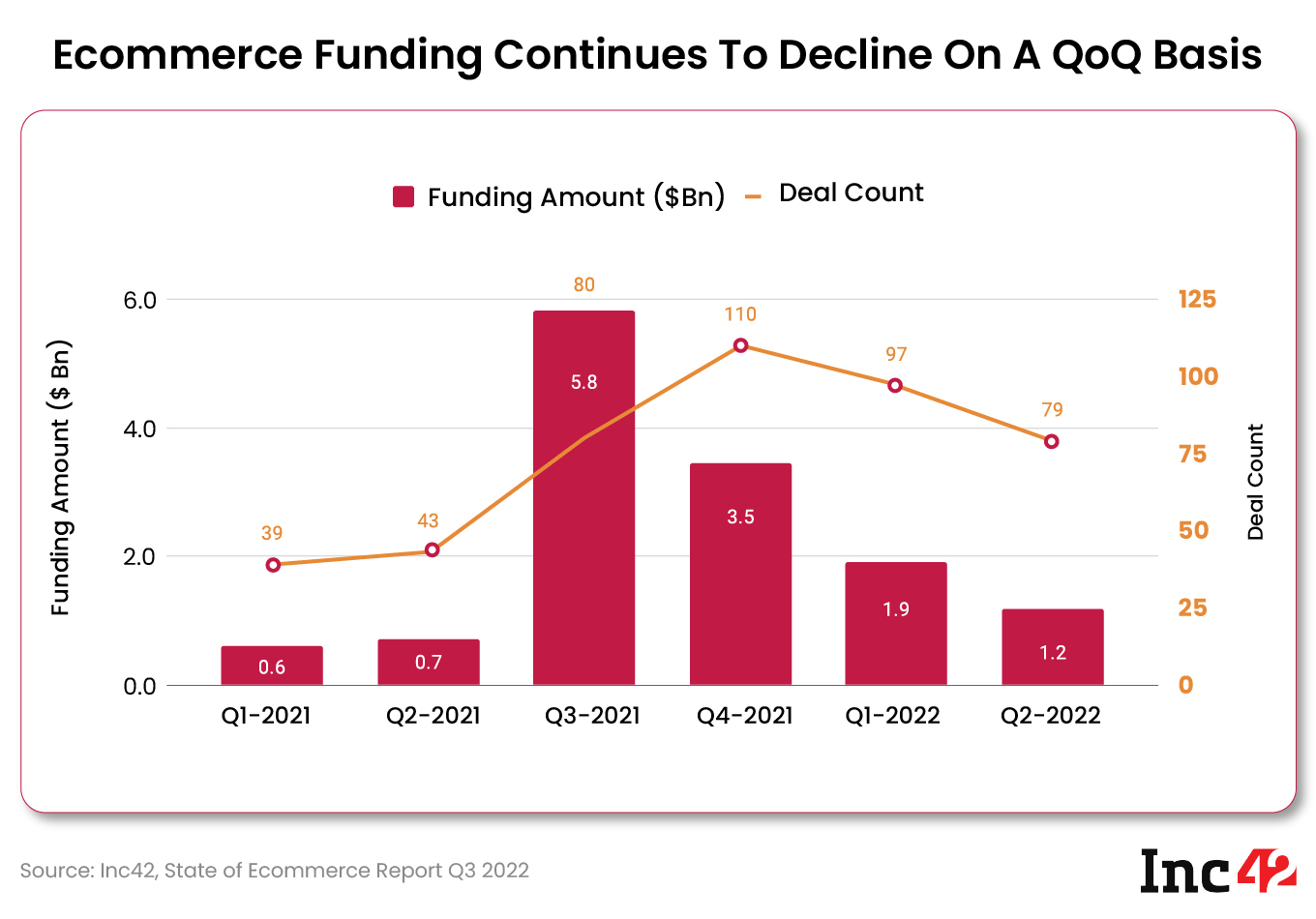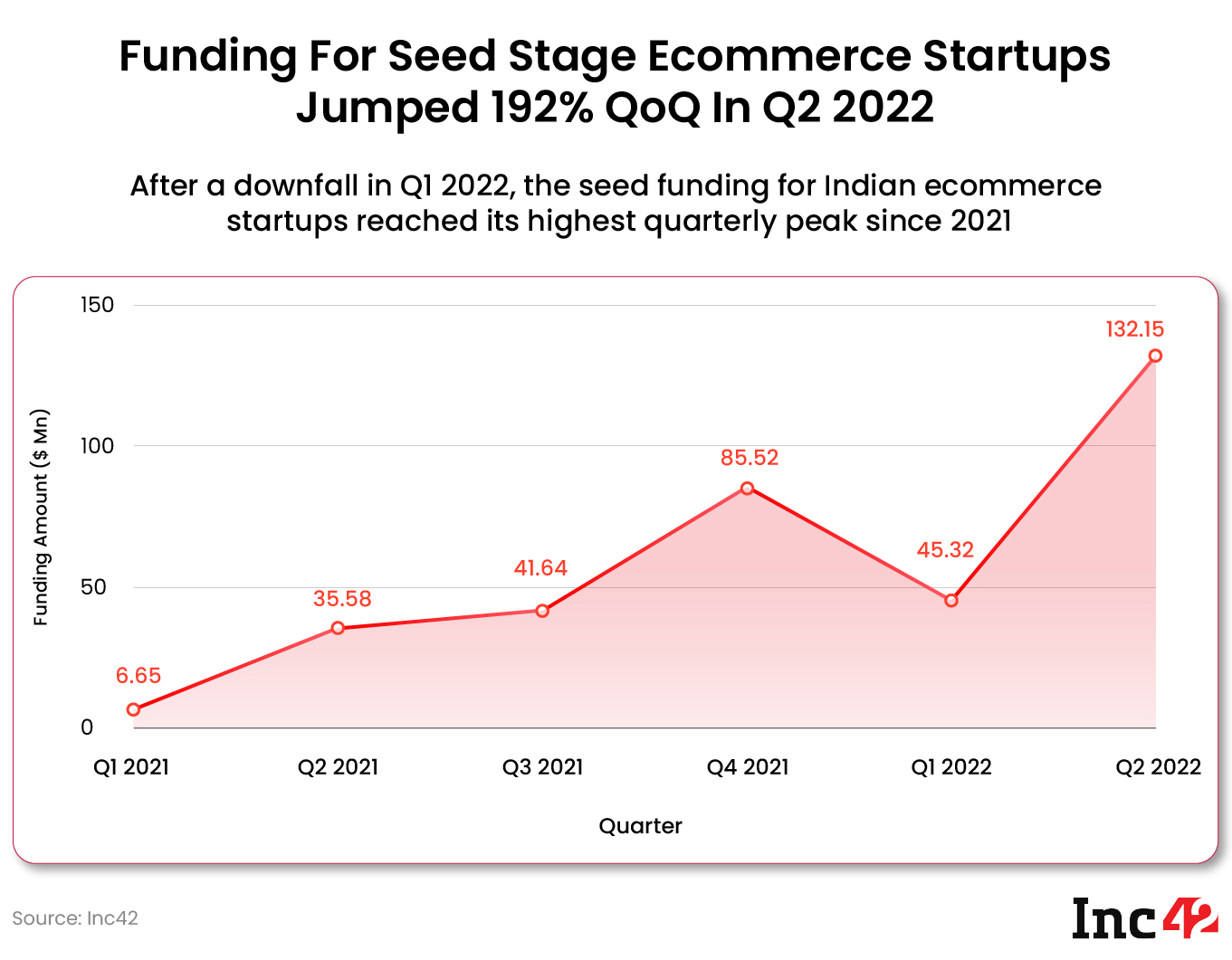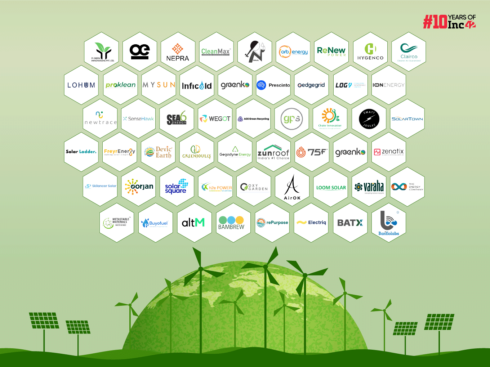SUMMARY
According to Inc42’s latest report, ecommerce startup funding fell over 80% in Q2 2022 to $1.2 Bn compared to Q3 2021
However, seed-stage ecommerce startups saw a 222% surge in funding to $132 Mn in Q2 2022 compared to Q3 2021
The average ticket size for funding in seed-stage ecommerce startups has increased to $3.2 Mn in 2022 from around $0.5 Mn in 2014, as per Inc42 data
India’s ecommerce startups raised a record $5.8 Bn across 80 deals in Q3 2021. However, the funding has been on a decline since then, with adverse global macroeconomic conditions further exacerbating the situation.
According to Inc42’s latest report on ‘The State Of Indian Ecommerce Q3 2022, Infocus: D2C’, ecommerce startup funding fell over 80% in Q2 2022 to $1.2 Bn across 79 deals from Q3 2021.

However, the funding at the seed stage for ecommerce startups grew more than three times during the same period.
According to Shashank Randev, partner, 100X.VC, early-stage startups are now trying to build on niche marketplaces with a differentiated approach; and these offerings are gaining investor attention who are ready to make bigger bets on them.
Further, the unfavourable global macroeconomic conditions have made investors more cautious about investing in late-stage startups.
Sheetal Bahl, partner at Merak Ventures believes that there has been rationalisation when it comes to funding across sectors in 2022, a correction which was perhaps a little overdue.
“Capital is available for problem solvers who are passionate and have sound business fundamentals. The decline in funding is compelling startups to look at profitability at an earlier stage. Seed-stage startups in 2022 are learning from this and already adapting,” he added.
Randev also hinted that seed-stage startups offer better exit opportunities to investors.
The seed-stage startups can also be good strategic acquisition targets for giants like Flipkart, Licious and the Good Glamm Group. One example is the Good Glamm Group’s acquisitions of Baby Chakra and The Moms Co., among others.
Funding Trajectory Of Seed-Stage Ecommerce Startups
In Q2 2022, funding raised by seed-stage ecommerce startups grew a whopping 222% to $132 Mn compared to $41 Mn in Q3 2021, while the number of deals also increased 14% to 32 from 28 in Q3 2021.
On a year-on-year (YoY) basis, seed-stage startups recorded a 277% gain in funding in Q2 2022, while the number of deals rose 129%.
At the same time, Q2 2022 saw a 192% jump in funding compared to $45.32 Mn raised in the previous quarter, Q1 2022. Meanwhile, seed-stage funding dropped over 47% quarter-on-quarter (QoQ) in Q1 2022, which can be attributed to increased market volatility in the aftermath of Russia’s invasion of Ukraine and a continued focus on late and growth-stage startups.
However, the funding scenario has been largely positive for seed-stage ecommerce startups in the post-pandemic era.

Key Challenges Ahead
India’s ecommerce market has been thriving on the back of increasing penetration of smartphones and rising digitisation.
According to Ankur Bansal, cofounder and director of debt funding platform BlackSoil, the last two years (2020-2021) were pivotal for the ecommerce space in India as the Covid-19 pandemic helped digital marketplaces add and retain new users.
“To sustain and scale, one of the first and foremost challenges for an early-stage ecommerce startup is to build a niche and find a large enough market for customers who are willing to buy online,” he added.
Here are some of the other challenges for early-stage ecommerce startups as highlighted by industry experts:
- Deep discounting: India is a price-sensitive market. Over the years, players like Amazon and Flipkart have ruled the market with discounts as a core strategy for extensive backing from VCs and the business scale. However, this approach ends up hurting the balance sheet of smaller players.
- Managing returns: Most marketplaces have a 30-day return policy within which a customer uses a product and returns it. Sometimes the returned products are damaged, and reselling these damaged goods is a challenge for small marketplaces.
- Cost of unsold inventory: Most seed-stage companies run on pre-purchased inventory-led models, and on average have 15% unsold inventory every year, according to Randev. The costs of storing this unsold inventory, warehousing personnel, insurance and security affect their profitability path.
- Customer retention: Building initial trust among sellers and customers and creating a brand presence plays a crucial role in customer retention. However, startups have to deal with factors such as changing consumer expectations and easy substitutes, which makes it a dynamic problem.
The Road Ahead
According to Inc42 data, the overall ecommerce opportunity in India is projected to reach $400 Bn by 2030, growing at a CAGR of 18.9% between 2022 and 2030. More than 5,120 active ecommerce startups are leveraging this opportunity as the number of online shoppers is on the rise in the country.
From a funding perspective, while there has been a decline, ecommerce startups are more than optimistic with the festive season around the corner. The increasing digitisation, internet penetration and easy-to-adapt digital payments and SaaS solutions have opened up doors for the over 440+ active early-stage funded startups in India to expand towards Tier 2 cities and beyond.
Further, as Bahl highlighted, the decline in funding has forced startups to look at profitability at an earlier stage. Seed-stage startups are learning from this and already adapting.
“Our mid-term view is (that) things will turn around in the next year or so, however, most investors will continue to seek startups with sustainable business models, with sound unit economics,” he added.
However, this seems to be the case for every other sector and startup at all stages. With analysts expecting a funding winter of at least 18-24 months and many late-stage startups looking at cutting down expenses to increase their runway, investors in the ecommerce sector are expected to continue placing their bets on seed-stage startups, albeit with a higher ticket size.
According to Inc42 data, the average ticket size of funding for seed-stage ecommerce startups has increased to $3.2 Mn in 2022 from around $0.5 Mn in 2014. The new-age entrepreneurs, now having seen all the market cycles of the last decade and the pandemic, are expected to focus on unit economics from day one, further attracting investors to place higher bets at the seed level.
Ecommerce is among the rare few startup sectors which have evolved to the point where companies can charge consumers for convenience, making profitability a more real prospect in contrast with some of the other sectors such as fintech.
Government initiatives like Digital India and ONDC, and the prospective rules for ecommerce will also aid in the growth of the sector in the country.



























